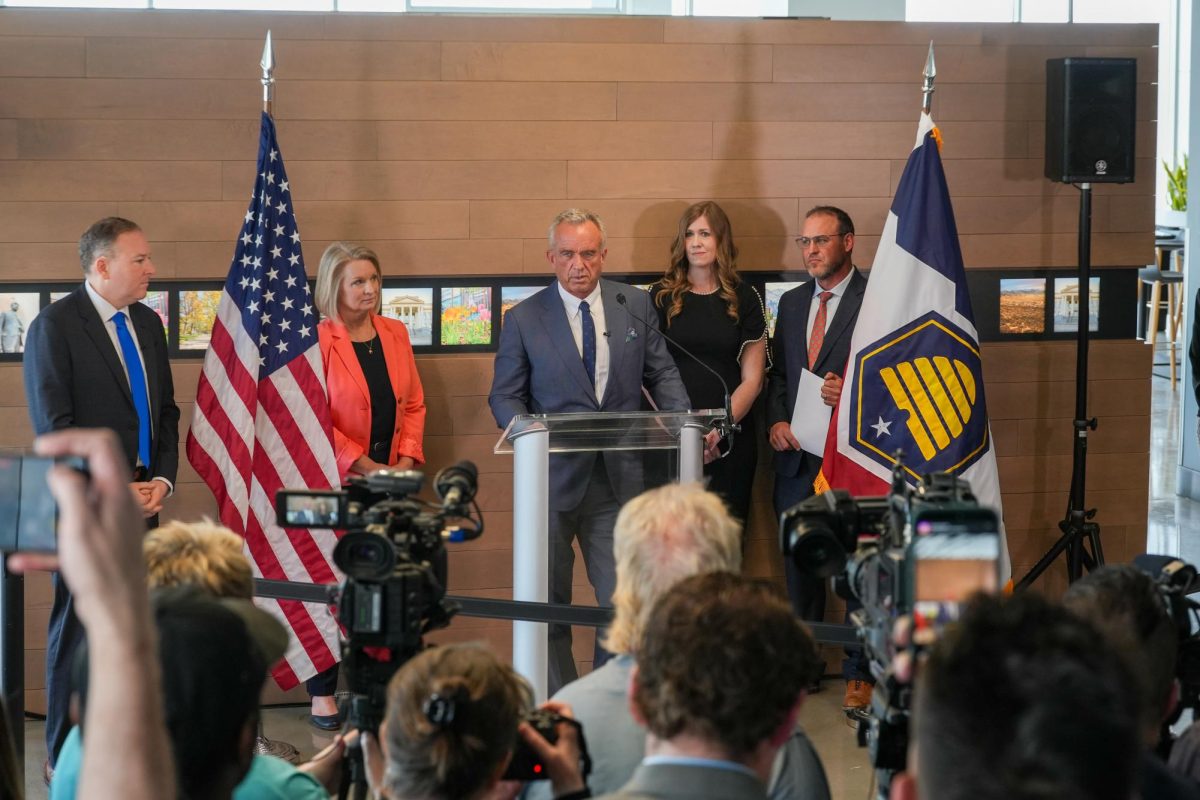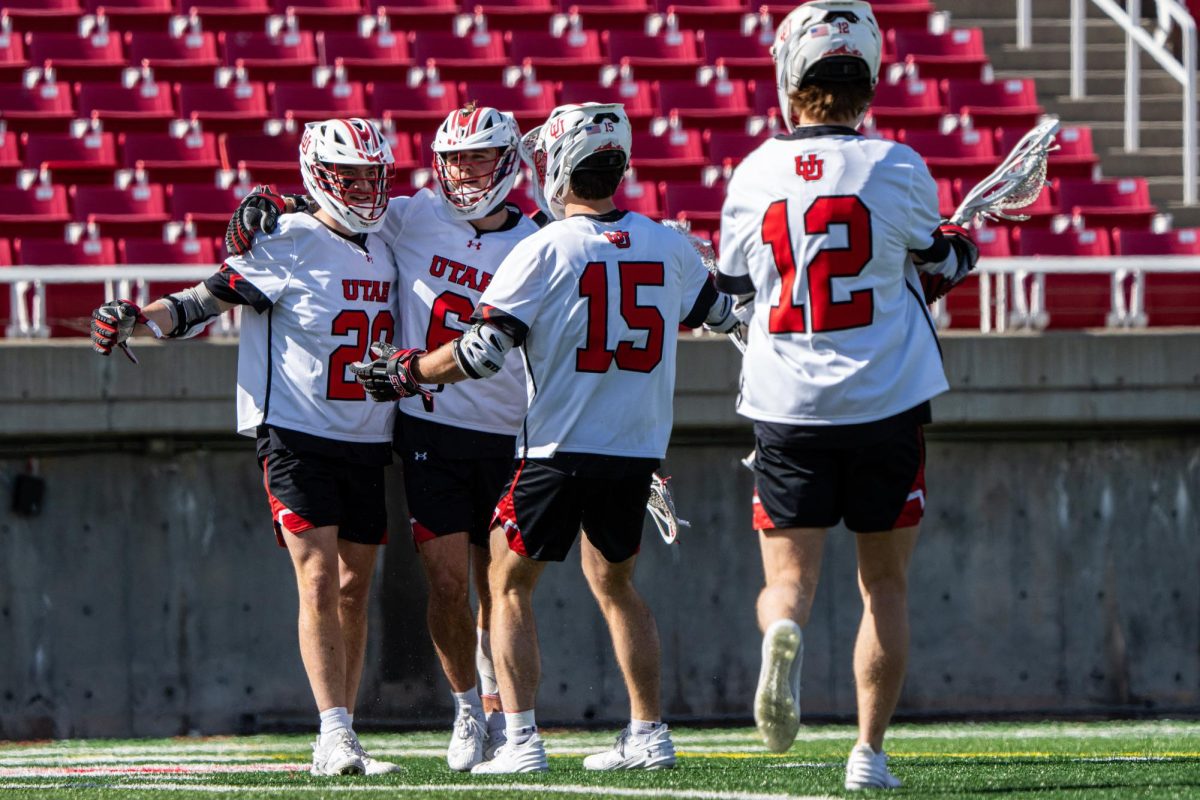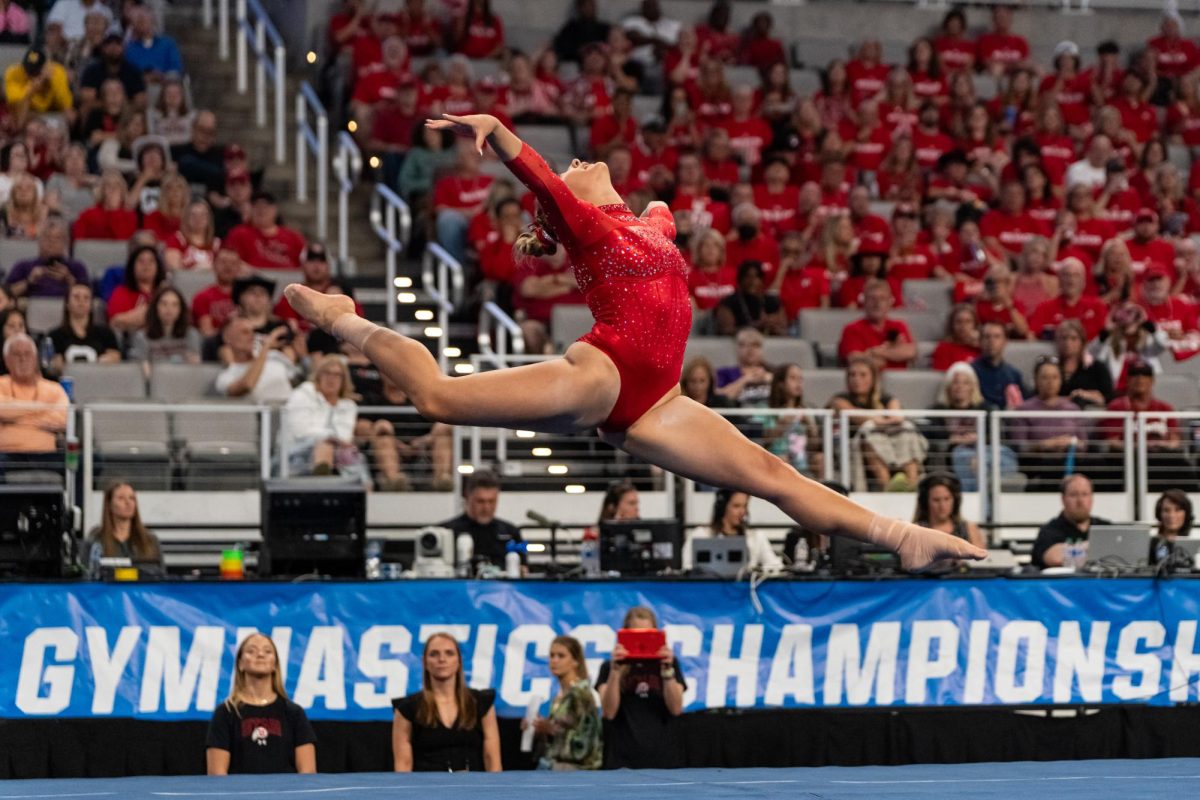Alexander: Let’s Get Rid of Black History Month
(Photo by Curtis Lin | The Daily Utah Chronicle)
February 1, 2021
Personally, I don’t think we should have Black History Month at all. The Black community doesn’t deserve to have their entire history condensed to fit into the shortest month of the year. But it happens. Every year, it happens. And organizations, companies and schools butcher Black history and focus on the same few figures: Martin Luther King Jr, Rosa Parks, Frederick Douglass, maybe a little bit of Malcolm X. Of course, they were instrumental in the Civil Rights Movement (and in Douglass’ case, abolishing slavery), but this is just a glimpse of Black history and primarily focuses on the past 60 years of US history. We are not putting forth our best effort to commemorate and celebrate Black history. Not with these mild attempts and brief timelines. Attempting to cover the entirety of Black history in a single month to promote comfort among our white-washed history pages is demeaning to Black ancestry. Through a more inclusive and diverse curriculum, Black history can be celebrated every day and treated as a crucial and essential part of America’s historical discourse.
The Father of Black History, Carter G. Woodson, first came up with the idea of “Black History Month” back in 1926. But at the time, it was introduced as Negro History Week and was the second week of February. In 1976, it became celebrated for the entire month of February, thanks to President Gerald Ford. And ever since then, we have celebrated BHM annually.
Woodson’s brainchild wasn’t meant to last, as he hoped that “time would come when Negro History Week would be unnecessary” and that people would “willingly recognize the contributions of Black Americans as a legitimate and integral part of the history of this country.” If we start to adopt Woodson’s dream as our own and provide and adopt a more inclusive and thorough approach to Black history, we can get rid of the condensed and oversimplified version of Black history we now know. We can embrace the entirety of Black history as a part of our national history and in turn undo the failures of previous historians.
Despite the feeble attempts made by US schools to cover Black history, these institutions are severely lacking in in-depth teachings. And as a source of knowledge, the education system has no excuse for doing the bare minimum. US history textbooks and curriculum are dominated by white-European history, and the absence of Black history aside from slavery and the Civil Rights Movement is evident. Talk of racism and race as a whole in classrooms is avoided — as many feel uncomfortable talking about issues of race — and focusing on institutional racism in our schools is even harder to face with white privilege rearing its ugly head. Some schools even fail to cover the Civil Rights Movement and police brutality as a whole, which is telling of how much schools are willing to participate in BHM.
Our history courses often forget that in MLK’s “I Have A Dream” speech, he states that civil rights devotees will “never be satisfied as long as the Negro is the victim of the unspeakable horrors of police brutality.” Without in-depth teachings, educators are proving that the surface level of Black history is enough to keep them comfortable, as opposed to reassuring and making Black students feel a part of much of Black history. With this erasure, Black and brown students grow up knowing all about white history, but not their own, and feel more and more isolated. Not only is this an educational malpractice, but it worsens the racism found in the education system. But if schools start incorporating more thorough teachings about Black history in their curriculum, then the need for BHM will falter, and we can accept the entire history of the US instead of the white-washed version we have now.
The education system has let down millions of students who hope to understand their own history, which is revealing in a nation where Black people were once considered “3/5ths” of a person. And I’m not the only Black person who feels this way, as if society and the education system are doing the bare minimum to make a major chunk of American society feel included. University of Utah’s own Black Cultural Center Director, Meligha Garfield, had plenty to say on the matter of BHM. Meligha’s start to Black history was by his own parents after a kid in Meligha’s kindergarten class asked “‘if he was Black because he drank chocolate milk.’”
It wasn’t until his third grade that Meligha started learning about the surface level of Black history, as he said, “it was kind of bare-bones, of course, we talked about historical figures like Martin Luther King, Rosa Parks and things of that nature but not really in-depth, like where do we come from, like why it’s structured like that or why is it like that today.” Then Meligha truly didn’t get into the depths of Black history until college, where he had Africana studies. Not only did the public schools fail Meligha, but they failed millions of other students who had to wait until college to start understanding their history. With the accomplishments of Black people being overlooked, the American historical discourse is incomplete, and we need to do more to fix it. Black and brown students are growing up without a sense of their own history. That’s why schools need to ultimately adopt a more inclusive and diverse curriculum.
Getting rid of BHM is long overdue. At its best, BHM helps people learn, understand and admire the accomplishments of high-profile, influential Black people. It provides companies, schools, and organizations the chance to boast inclusivity, and commemorate Black figures through events and products. At its worst, it fails to cover the entirety of Black history, and instead focuses on few Black historical figures and the past 50 years of US history, blatantly erasing centuries of Black history and struggle. If educators and leaders adopt an inclusive approach to discussing Black history in further depth, we can begin helping the Black community feel represented as a part of the US’s historical fabric, while their white counterparts can assimilate to Black culture and recognize its integral role in society. Black history should never be a task or check box for people to complete for one month of the year. Recognizing and learning Black history should be a constant effort.













David • Mar 5, 2023 at 12:12 am
It sounds like this should be less of an article about getting rid of BHM and more of an article about how we should be working harder as a society to set out the conditions Woodson outlines to no longer need it. Then again, a “let’s get rid of BHM” title will probably get more clicks than a “let’s make it so we don’t need BLH” title won’t it?
Coleman • Feb 22, 2023 at 2:01 pm
Black history month should be “We have been here from the start and we are just now claiming our new accomplishments” If we took black history, and its history in total, it couldn’t even have a cliff note version. Why are the accomplishments always new and in the United States or first world, yet Africa is either in war or still living in tribes? It is racist in and of itself. Way to embrace racism my black people!
Jerry • Feb 18, 2022 at 12:45 pm
If we keep a black history month we should have a white history month.
Robert • Feb 3, 2023 at 2:21 pm
August has no nationally recognized holidays. Maybe it should be designated “Stop Blaming the Straight, White Guy Month”.
brian • Feb 11, 2024 at 3:48 pm
And Asian month, Brown month, and many more cultures. Really most could do without the black BS push.
jess • Feb 10, 2022 at 6:02 pm
yes do away with it. its boring and pointless for people of other races.
Anthony • Feb 1, 2023 at 1:54 pm
Wow, that might be the most racist thing I’ve ever heard. The purpose of black history month is for “other” races, not to educate black people on a subject they’ve lived for generations.
Craig Gary • Feb 10, 2024 at 9:29 am
Oh dry your eyes. Black history month is to educate black people and not people of other races. I couldn’t care less about any races history month. Whether black, white, asian or aboriginal. And like every other race I’m sick and tired of black people blaming everybody else on the planet about how terrible black people have it. They should really dig into black history and see just how many awful acts have been committed by black people against other races. Of course that wouldn’t fit the modern agenda. Never mind trying to “educate” other races, black folks should start looking closer to home.
Annette Shull • Sep 29, 2021 at 7:51 am
The comments are embarrassing! If you are going to comment please do not make yourself look more ignorant than you already are with horrible grammar and misspelling! If you are going to judge someone by their skin color it’s racist no matter their color. I have biracial grandchildren and never look at them as a color! They are kids and all have the same color of blood! If you can’t move on and need someone else to teach you history and can’t research on your own, then YOU are the problem! I’m sick of all this racism from both sides! I may look white, but have ancestors that were slaves! Get over the color blindness and be responsible for yourself!!
Robert Sherman • Feb 3, 2023 at 6:23 pm
Good comment.
Brad • Apr 10, 2021 at 4:57 pm
I would love to see the uproar from the same people who knock down monuments of white men.
let the double standards begin and let me get my beer with popcorn
 .
.
yes, popcorn with beer.. I’m a strange whiteboy .
.
Anthony • Feb 1, 2023 at 2:08 pm
What black history? I’ve lived through 40+ black history months and don’t think I’ve learned a single thing about black history I didn’t get in like 3rd grade, which used to be when they covered MLK and Rosa Parks. As parent of a half black half Mexican child, I kind of assumed there isn’t any other black history (likely due to racism and slavery’s affects on black people in the US) and I didn’t see any in your article or anywhere else.
I do like what Morgan Freeman said in an interview where he asked the Jewish interviewer if he wanted a Jewish history month and the man said very surely and quickly, Noo. Morgan said he didn’t either and for the same reason.
Certain races like Japanese or Indian are seen as essentially “white” with stereotypes like being smart, overachieving, owning businesses, etc. and those races don’t have a month but with Mexicans being looked down upon by all other Central and South American ethnicities, my son has two months. One is the shortest month of the year and the other isn’t even a month, it overlaps between two different months. Getting a month is a diss.
Anthony • Feb 1, 2023 at 2:11 pm
I’m all for getting rid of BHM but it sends the wrong message to just get rid of it. How about we teach black history properly before getting rid of the month?
Stephanie Groff • Feb 23, 2021 at 11:25 am
Wonderful and thoughtful article, CJ. I can’t believe there are Black people on here saying you are not Black. Insane. I am taking this incredible Black Feminist Theory course at the U as we speak, and a Black woman who speaks out being told by (several) Black men that she is not Black isn’t new sadly… that, and we know hardly ANY of the Black women behind the movement save Rosa Parks because BHM has been overwhelmed by the stories of the (influential, yet not partnerless) Black men. Yes – American Black (with Black female) history should be written into our overall national education as seamlessly as the stories of our “founding fathers” – and without the revisionist history version that ignores the part that the “founding fathers” owned slaves. Bravo for this article!! Keep it up!
Rev. William S. Beard • Feb 5, 2021 at 6:24 pm
Excellent article CJ, however, an immediate erasure of BHM would be a mistake, we fought too hard to escalate from one week to one month a year. But the progress of this movement could be speeded up if more positive people were interested in an unbiased history rather than a whitewashing of history in general. It’s just been of late, the past sixty years that we have what we have as far as black history goes. I totally agree with an honest inclusive history (world and U. S.) that people all over the world can see the accomplishments and failures of the whole of mankind.
Sebastian DeBoer • Feb 4, 2021 at 3:12 pm
Though your title is misleading, your idea is sound. But should we do away with Black History Month immediately? No! We should hold on to it for now, while we improve our curriculums to the point it is no longer needed. I would not stop taking my medication because I should be better soon, I would keep taking it until I have recovered.
Hannah Schmutz • Feb 3, 2021 at 5:17 pm
Hi! Just wanted to say, thanks for having the courage to write a controversial article. I am sorry that you have been attacked by people who are biased. (Their spelling doesn’t do them much credit either–there, I said it.) Thanks again, and I hope that Black history becomes more acknowledged.
Cindy Solomon-Klebba • Feb 3, 2021 at 4:55 pm
Well, it is obvious from the comments that we certainly need better education about African Americans in the U.S.! We also need more education regarding grammar and spelling. All that aside, thank you! I have mixed feelings as I agree with the premise that we need to teach African American history in a more authentic, deeper way. I also know that given the chance, white supremacy will take the removal of BHM as an excuse to eradicate the little attention we give to Black History. Yes, I want to see us address other groups (in fact I teach U.S. History from the perspective of the “non-white-guy.) I also know that we have limited time in classrooms (especially k-12, but also in the University.) Until we overhaul the system so that we are about education instead of standardized tests it feels a bit like we are stuck. If BHM is the best we can do until then I hope we will keep it. Most of all I hope we can get to the point where it ISN’T needed because we include everyone in history. In the meantime, I admire your courage and eloquence in the continuing struggle for equality and justice. Please ignore the naysayers (and, yes, worse) and keep up the good work!
Kevin Alexander • Feb 2, 2021 at 3:58 pm
Camden…..awesome article!! Your Granny Harriet and Grandpas Joe and Louis would be so awfully proud of you for what you’re doing. Keep reading, studying, and learning as much as you can each and every day. Also understand that in the media business, everyone won’t agree with your opinions and they will express that. Accept it and move on. Be strong. Remember…. you have to be able to accept people for what they believe, just like they have to accept you for what you believe. I love you sweetheart!!!
Uncle Kevin
Abby • Feb 2, 2021 at 1:31 pm
I agree with Ms. Alexander. Black History month is stupid. There isn’t an Asian History month, or a White History month. I wish I could’ve had more extensive education about every aspect of history instead of being somewhat limited to Kwanzaa in December (which is celebrated by only 13% of Black people, so it’s not very representative) and Black History Month in February.
There isn’t history limited to one race, why can’t we recognize the contributions of every race all year? Also, I’m disappointed that the AP tests only include US History and European History. I think we should also have Asian, African, and American (the two continents) History exams. Or at least a world history AP test that covers a little from each of the seven continents! I aced the US History and I did good on the European history test, but I don’t think I’ll be ready for Jeopardy until I learn a little more about the other parts of the world and all of history! The education system has failed me in that respect. After all, is there any better reason to learn other than to compete on Jeopardy?
John Johannson • Feb 2, 2021 at 1:02 pm
I can explain black history really quickly. 1. They lived on another continent. 2. sold into slavery by their own people. 3. Brought to America and sold to white people. 4. A small percentage of White people owned them and made them work and what history tells us treated them badly. 5. Civil war happens and 100s of thousands of white men died for their freedom. 6. White man still treated black people bad. Black people didnt deserve to be treated bad so they protested. 7. Since the 60s more than 20 civil rights laws have been enacted to protect black people. 8. Black people still hate white people and want reperations because some of their ancestors were slaves. 9. Today black people have all the same rights and privileges of white people, but dont want to take advantage of the opportunities and still want to blame the white man for all their problems. 10. Some very awesome black people have become great athletes, entertainers, CEOs of companies, medical geniuses, inventors and yes even President of the United States. We cannot forget the great black people throughout history and what they did, but it does not take all year or
even a month to do this.
AkaFiFi • Feb 2, 2021 at 11:47 am
History should be taught as America’s history, with all races side by side as they came into American history. It can start with the Indians, the Mexicans, the Whites, the Spanish, the Africans, Chinese and so forth. It should show the good, the bad and how America became a leading country.
Christine Alexander • Feb 2, 2021 at 10:54 am
For all of the negative commenters – I am this young lady’s mother! First off, please do not mistake your own bias on appearance of certain races with your assumptions about her race. My daughter is African American (Father) and White (Mother). She is not only well versed as you can read but she has experienced quite a bit of racism in her life due to who her father and mother are, as well as her family. Camden is now forced to deal with the commenters ignorance in bias because she may not have the physical attributes that come with being 100% African American but let’s be honest here – how many of us are 100% any race/ethnicity in this day and age. Again, your assumptions that she cannot understand the history, struggle and depth of African American culture, etc. is way off base!
Camden, your father and I as well as your entire family who is predominately African American is extremely proud of you and the efforts to bring these tough topics for discussion.
Pamela Jackson • Feb 2, 2021 at 9:13 am
I can agree with Ms. Alexander on her point about Black History in general. However, I would like to remind her that other races in our country need acknowledgement as well. We have Native Americans that our ancestors stole this land from. We have Asiian Americans, Espanic Americans, Jewish Americans, and the list goes on. Yes, we have been bombarded our entire lives with “White” history and now it is time to learn more about Black history AND the history of others who are American citizens whose ancestors also came here as immigrants. So much history of those who make up this country, but so little about others whose histories are ignored.
Earnest johnson • Feb 2, 2021 at 8:29 am
Listen mis Alexandra no harm intended but I disagree with you whole Hartley this is something we as black peoples have earned respect for . but you don’t under stand any thing about black peoples except what you have been told the only way you will feel and know what we feel is because you are not black. my reveltives were beaten lyniched and Murder just for been black.we have always been mistreated from day one and still are we are the ones that built this country didn’t no white peoples slaved and put in chains and dehumanized so be very careful by what you say and how you say it. Your peoples are not been killed by the racists cops beating down and hunted down like dogs why don’t you first try getting to know black peoples. Find you a black friend a get to know him or her hang out with them a get to know and understand thep
Tobias • Feb 9, 2022 at 2:07 pm
First and foremost, one must understand the culture and race arguments. As it has been stated in many of the comments. It does not matter the color of your skin or nationality or even the country you come from, you are American. This ultimately gives you the exact same rights as any other American in this country. To do something with it is entirely up the person that feels discriminated or judged. I am from Germany personally and have followed these debates since I was a child. Every time someone screams racism the truth is they felt they were more entitled then the person next to them. Take responsibility for your own life and the circumstances that you bring upon yourself. In Germany we are reminded daily of what occurred during the reign of a dictator. One that enslaved people, due to his own racist beliefs. You do not hear them crying for help or even blaming anyone for what had happened to their ancestors. No they moved on. Keep in mind that this is more recent then slavery and the Civil War. You are provided the opportunity to better yourself and help your family. Stop blaming others for your laziness.
Barry Leming • Feb 2, 2021 at 7:17 am
Salient point. Good perspective. Hope they don’t attack you for being honest. Look forward to you followup on Hispanic Month, Womans Month, and all the others.
Charlene Lewis • Feb 2, 2021 at 7:15 am
Honestly, I’m not sure if we should get rid of BHM. But there is a strong consensus that BHM should be included in the year round educational system. The opportunity to have all students become more familiar with the contributions besides the stuggles of black people would have all aware. This nation was not built by just white people. It is a melting pot of different nationalities, cultures, entic groups, ideas, and histories. No one man or group helped make this USA great. Everyone must come together and tell the truth. All people if color and race are responsible for this!
Stacey • Feb 2, 2021 at 6:57 am
Good morning.
Thanks so much for this information. As a mother of three black children I often wondered why our history was watered down. I’ve had two children graduated from school and now my youngest is in the sixth grade and I’m learning more about our history and want her to know more. It’s ashame that as a mother I have to teach my kids about their history at home because so much of our history is left out and can’t be taught in 28 days. I’m learning more everyday and what I’ve learned I pass it on to my kids and my grandson.
Evon • Feb 2, 2021 at 6:56 am
First off, I have little respect for narrow-minded people and their comments. The fact you get the opportunity to post shows you have little knowledge of your history. I am not sure of your race but if you are not (White)then you are considered to be a black person. Please no you’re worth before you post unhealthy comments or articles.
Linda Howard • Feb 2, 2021 at 6:46 am
We need the holiday. I’s ok , we don’t have a
Parade or anything that’s ok too. Our people don’t care about that. We want our black professionals , politictians, teachers, educators get together right now and write books and books about black history the way it should be written. Put them in all schools in America. We don’t want any child to say again, can I feel your skin my mom said black people skin is scalely.
Pops • Feb 2, 2021 at 6:41 am
She don’t understand black history. If don’t understand don’t talk about it. Everyone should know about black history
Sharon Patterson • Feb 2, 2021 at 6:39 am
Try living in lafayette Louisiana where a origram on the gistory of voting rights was voted too liberal. The grant, already approved, was denied. We can’t present this issue fairly and without bias, was the council’s opinion. This opinion strongly encourage by the mayor Josh Guillory, a good ole boy. The “whites only” cemetary is not too far away. This is Lafayette Louisiana in 2021.
Valerie Alderman • Feb 2, 2021 at 6:03 am
This article was long overdue. I’ve said it for years, we should celebrate Black history every month. One month isn’t sufficient enough time to teach about all of the accomplishments Blacks made building the United States and countries around the world. Our footprints touched every corner and we have been erased from the history books for those accomplishments.
Thank You. Maybe just maybe someone will listen.
Joseph • Feb 2, 2021 at 5:08 am
That’s one of the most resist story I have ever read. I grew up with a lot of white people who I can assure you were not privileged. This kind of artical promotes segregation and racism. Doesn’t take a collage degree to figure that out. My generation did not focuses on skin color. The media is trying to keep racism alive. SAD
Dorinza • Feb 2, 2021 at 1:46 am
I think I would like to hear your opinion on incarceration and black history month.
Tina Michelle Horton • Feb 2, 2021 at 12:54 am
Alexander, we not get rid of Black History Month, but it should be celebrated month then one month it should be Celebrated throughout the year. Because Africa American culture did many great things throughout the year and not only in the short month of the year.
robert parker • Feb 1, 2021 at 10:46 pm
I love this article, because you are speaking the truth I too share the same thoughts about black history just being confined to one month and very little education is being taught about black history. Thank you for your article I do hope this reaches a lot of people.
Mike Nelson • Feb 1, 2021 at 9:32 pm
CJ thank you, you are so right, but it is a start. I remember when I was in high school (1968 – 1972) the Ashanti Club put up displays. The first step has to be an honest accounting of history, that teaches the truth! Nice article, this old science teacher approves!
Mimi • Feb 1, 2021 at 9:09 pm
I love this Hopefully this will come true very soon
Hopefully this will come true very soon
Carolyn Shine • Feb 1, 2021 at 8:07 pm
If we did that. Would the schools teach black history? I truly doubt it.
Dwayne jac • Feb 1, 2021 at 7:36 pm
You are not African American, first you need to go to your group and telling them, we need to stop read our history and Celebrating. Just remember this..you are not black. So mind your’s business
William Flowers • Feb 1, 2021 at 7:29 pm
Black History should began with the first humans (home sapiens) on the earth With the advent we know that these people were black,living in modern day Ethiopia. The Discovery Channel produced a wonderful documentary on this subject titled THE REAL EVE.IT’S A MUST SEE.